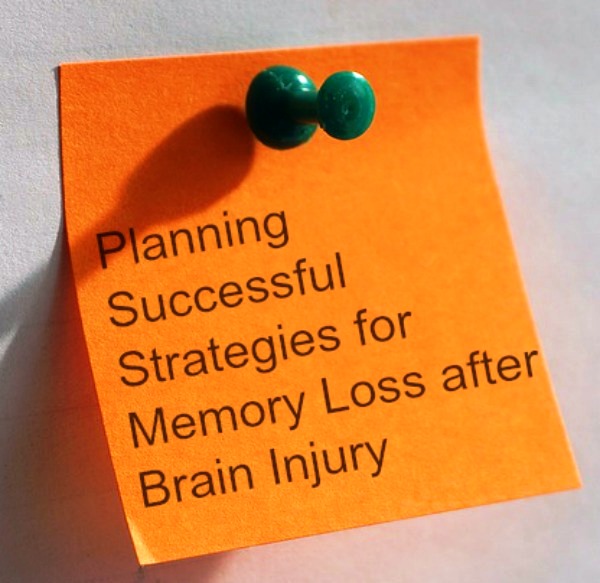Tips and strategies for memory loss after brain injury often focus on use of a diary and other remembering aids. Today I want to begin with a broader range of strategies to think about.
Today a range of broad strategies and thoughts about how to set up strategies that suit a person’s lifestyle and needs. Next week lists of more specific ways you might use these strategies.
Types Of Memory Strategies
Before beginning let me explain the focus of these strategies. There are two broad types of strategies for memory. Restoration looking at retraining memory. Compensation finds ways to work around memory problems.
Restoration
Restoration – improving and retraining memory. Commonly using repetition and memory recall techniques.
Restoration / Memory Retraining may not be the best approach for a person with brain injury. I have not had extensive experience with memory retraining as a strategy for memory loss. The reading I have done suggests it is labour intensive and not hugely successful. It can also add stress to both the person with brain injury, and brain function.
Consider though – emerging evidence about plasticity and the brain. The more you use it the more strong pathways are created. This may then help memory. Who said anything about the brain was simple – not me.
Compensation
Working around memory loss. Finding external ways to remember and recall what is needed. This approach is more likely to take pressure off an already stressed brain by creating external prompts and information.
Most of this article and the promised lists next week relate mainly to compensation. My plan is to bombard you with all kinds of ideas. You then work out what might suit your situation. You might also add suggestions in the Comments below.
General Tips For Successful Strategies for Memory Loss after Brain Injury
[ordered_list style=”decimal”]
- Strengths first – build on the strengths, what a person is good at, what is around a person that might be helpful.
- It may be easier to work from the place that forgetting is the norm. Plan that you will forget and have the strategies ready to go.
- Along with being careful about selecting the best strategies. You need to modify each strategy to suit.
- Expect to have to repeat, repeat, repeat, and then some- to have any chance of being effective.
- Remember some strategies need to be in place for a long time – maybe a lifetime.
- Consider the following questions:
[/ordered_list]
What areas of memory are having the most impact on life? – I want to finish my study but short term memory is messing up by ability to learn new stuff.
What will best reduce the need to put pressure on the brain to remember or recall? It is about creating the best opportunity for memory to work well?
What could create an ‘Automatic Pilot” for as much of daily life as possible?
What needs to be remembered? What are the most important things to remember? I might have a person looking after my diary and appointments so I don’t care about remembering dates, but I want to cook my meals so I do need organization and strategies for cooking.
What strategies best suit lifestyle, knowledge, skills? – a person who has not used a smart phone may find it even more confusing after brain injury.
Getting Started
Examine:
Using the points above – a careful investigation of what is happening to help choose the best strategies.
Look at:
[unordered_list style=”tick”]
- what is remembered,
- what gets forgotten
- what are the stumbling blocks?
- what has been tried and how did it go?
- what went well – keep it.
- what did not go well – change or modify it.
[/unordered_list]
Explore:
Research, brainstorm, and discuss the best strategies based on your investigation. Next weeks list might help with ideas.
Employ:
Carefully and consistently use the strategy / strategies agreed upon.
Make sure everyone is doing the same thing.
Evaluate:
Review, change, and modify the strategies at agreed intervals,
or if the strategy is not working,
or if it has created change and is no longer needed.
Strategies for Managing Memory Loss
It is likely during your investigation of what is happening now, you have come up with one or more factors that affect memory. Things like fatigue, stress, lack of organisation. These headings below might be a good starting place to explore ideas for effective strategies.
Reduce Fatigue – Know your limits and act before cognitive fatigue is an issue. Fatigue can make all other functions worse.
Manage and minimize stress – Notice what creates stress and when it occurs. Strategies that addresses stress before it happens are best but it may also be necessary to have strategies for when stress overpowers memory.
Live a healthy lifestyle – Eat well, regular exercise, adequate sleep, eliminate or minimize substances harmful to the brain such as alcohol and smoking.
Keep the brain active – use it or lose it!
Reduce the need to think:
[unordered_list style=”tick”]
- Create External Memory Aids
- Be Super Organised
- Pay Attention to Attention
- Use a Memory Trick or Two
- People Power – use other people to help to remember
[/unordered_list]
And Finally
Click on the following if you want more about –
- changes to memory after brain injury
- what is normal memory
- what are the different stages and types of memory
- what parts of the brain are involved in memory
Next week – more detail on strategies that might be helpful to manage memory loss.
Finally a short video that summarises memory function and provides additional strategies. ‘Understanding Memory’ below is by Darek Prokashka.


Pingback: Memory Strategies After Brain Injury - Changed Lives New Journeys
Pingback: Strategies for Organisation Planning and Problem Solving After Brain Injury - Changed Lives New Journeys